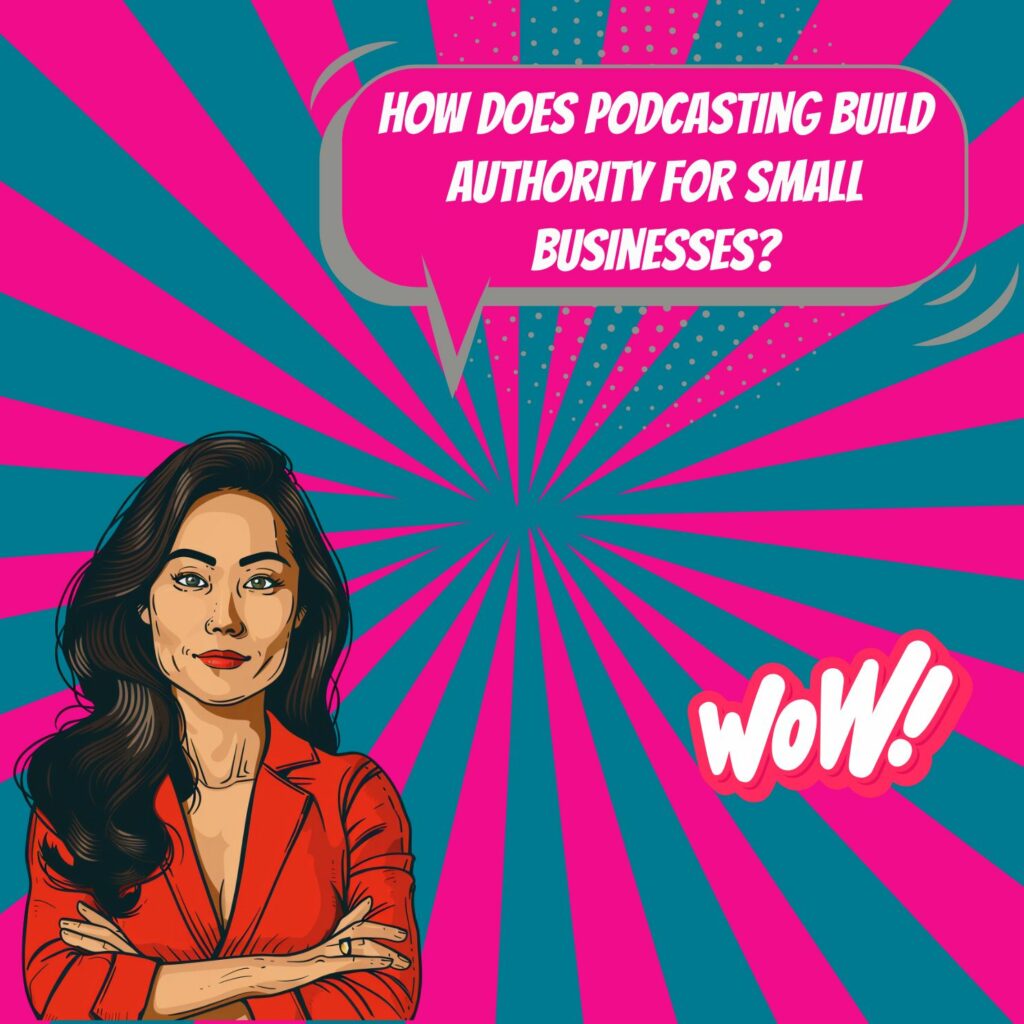Key Takeaways
✅ Establish Thought Leadership and Authority: By producing valuable and informative podcasts, small businesses can position themselves as industry experts. This builds credibility and influence within their niche, attracting a loyal customer base.
✅ Build Intimate Connections with the Audience: Podcasting allows for a unique level of intimacy with listeners, fostering personal bonds that translate into greater customer engagement. This relationship-building can drive conversions and enhance loyalty.
✅ Repurpose Content Efficiently and Cost-Effectively: Podcasting is a cost-effective way to create content that can be repurposed across different channels. This maximizes marketing dollars and broadens reach without high costs.

Introduction
Have you ever wondered how small businesses can stand out in an increasingly crowded market? Traditional marketing methods often fall short, leaving business owners scrambling for new ways to establish credibility and connect with their audience. This is where the power of podcasting comes into play. Recent statistics show that over 50% of U.S. households are podcast listeners, revealing the medium’s growing popularity. However, for small businesses, the journey into podcasting can seem daunting. Common fears include lack of content ideas or the belief that only big brands can grasp the reins of this platform.
But with authenticity and a strategic approach, even the smallest ventures can tap into this powerful tool. This article explores the avenues through which podcasting can propel your small business to new heights, offering actionable insights that you can apply today. Whether you’re looking to build authority, foster a deeper connection with your audience, or efficiently repurpose content, the subsequent sections will uncover the groundbreaking techniques you need.
Top Statistics
| Top Statistics | Insight |
|---|---|
| Podcast Industry Growth: The podcast market is expected to grow to $4 billion by 2024. | This substantial growth indicates the expanding opportunities for small businesses to tap into podcasting for increased visibility and reach. |
| Podcast Popularity: 37% of Americans listen to podcasts in the last month, and 63% of listeners tune in weekly. | The consistently high engagement rates highlight how podcasts are becoming a vital medium for reaching a dedicated audience. |
| Podcast Advertising: Almost 90% of podcast listeners think podcast ads are effective, and over 55% have made a purchase based on a podcast ad. | The high trust level in podcast ads implies that advertising within podcasts can substantially drive sales and consumer engagement. |
| Increase Visibility: Podcasts are a great way to increase visibility and get a message out to a wider audience. | This is crucial for ongoing business growth and establishing a significant market presence. |
| Enhance Credibility: Podcasts can help small businesses enhance their credibility and establish themselves as experts in their field. | Through consistent and relevant podcast content, businesses can position themselves as industry leaders. |
Establishing Credibility in a Crowded Market
In today's saturated market, small businesses need to find innovative ways to stand out. As traditional marketing methods like print ads and emails falter, podcasting emerges as a potent alternative. Through podcasts, businesses can establish credibility by delivering consistent, valuable content that directly engages their target audience. Unlike conventional ads, podcasts offer a non-intrusive platform that fosters a genuine connection between the listener and the brand. This engagement builds a sense of trust, which is crucial for long-term success. By positioning themselves as thought leaders, businesses can rise above the noise in a crowded market.
The Rise of Podcasting: A Powerful Marketing Tool
Podcasting has seen explosive growth, with an estimated 55% of the U.S. population having listened to a podcast, according to Edison Research. This medium captivates a diverse demographic, ranging from busy professionals to young adults. What makes podcasting so appealing? It’s the blend of convenience and intimacy; listeners can tune in during their commute or while working out, all the while building a personal connection with the speaker. Podcasting offers a unique way to reach audiences who might be unreachable through other channels. It also allows for in-depth storytelling, which can captivate and retain listeners more effectively than traditional ads.
Building Authority through Podcasting: How It Works
Creating a podcast allows small businesses to share their expertise and authentic voice. By regularly delivering high-quality, relevant content, businesses can position themselves as thought leaders in their industries. Consistency is crucial—as listeners come to expect regular episodes, they start to see the podcast hosts as reliable sources of information. This, in turn, builds trust and loyalty, key components in converting listeners into customers. Honesty and passion also resonate well, making authenticity a core pillar of success in podcasting. Furthermore, engaging with listeners through Q&A sessions can enhance credibility and foster community.
Case Studies: Successful Small Business Podcasts
Take, for instance, the story of "Shopify Masters," a podcast by Shopify that highlights successful entrepreneurs. Through insightful interviews, they not only provide value to their audience but also strengthen their brand authority. Another example is Amy Porterfield's "Online Marketing Made Easy," which demystifies digital marketing strategies for small business owners. These examples showcase how effective podcasting can be in elevating a brand's status and expanding its reach. These success stories illustrate the potential for small businesses to significantly enhance their market presence through podcasting. By sharing real-life experiences, they inspire and educate their listeners, fostering a loyal community.
Getting Started with Podcasting: Best Practices
For small businesses looking to dive into podcasting, several steps are vital for success. Deciding on a podcast format—whether it’s interviews, solo shows, or a roundtable discussion—is the first step. Investing in quality equipment, like a good microphone and soundproofing materials, is also critical. Developing a strong content plan that aligns with your business goals can set the stage for compelling episodes. Additionally, it’s essential to avoid common pitfalls like inconsistent scheduling or ignoring listener feedback. Tools for measuring success include tracking download numbers, listener demographics, and social media engagement. Regularly analyzing these metrics can help refine and improve the podcast over time.
Monetizing Your Podcast: Revenue Strategies
Once you've built a loyal listener base, various monetization opportunities arise. Securing sponsorships from brands that align with your business values is a popular option. Additionally, integrating advertising or affiliate marketing can create revenue streams. Businesses can also use podcasts to promote their own products or services, driving sales directly from the listenership. The key is to create significant value for your audience, ensuring they remain engaged and supportive, which ultimately turns your podcast into a profitable venture. Monetization should enhance the listener experience, not detract from it. Offering exclusive content or merchandise to loyal listeners can also generate additional income.
AI Marketing Engineers Recommendation
Recommendation 1: Leverage Audience Targeting for Podcasting: To build authority as a small business, understanding and targeting your audience is crucial. According to Edison Research, 75% of podcast listeners are more likely to follow brands they are already familiar with. Start by identifying the demographic and interests of your potential listener base. Use tools like Google Analytics and social media insights to gather data on your current customers. Create content that resonates with their preferences and speaks directly to their needs. This not only helps in growing your listener base but also establishes your authority by consistently delivering valuable and relevant content.
Recommendation 2: Utilize Guest Appearances and Collaborations: Strategic collaborations are highly effective in the podcasting landscape. Recent data from Chartable indicates that 68% of podcast listeners discover new shows through guest appearances. Invite industry experts, influencers, or even satisfied customers to share their insights and experiences on your podcast. This not only diversifies content but also introduces your podcast to the guest’s audience. These collaborations can exponentially increase your reach and credibility, positioning your small business as a trusted figure in your field.
Recommendation 3: Implement SEO Strategies in Podcasting: SEO isn't just for blogs and websites; it can be a game-changer for podcasting too. Optimizing your podcast titles, descriptions, and show notes with relevant keywords can significantly enhance discoverability. Use keyword tools like Ahrefs or SEMrush to identify keywords that your target audience is searching for. According to Podtrac, 50% of podcast listeners say they use search engines to find new podcasts. Ensure that your podcast metadata is rich with these keywords to rank higher on search engine results pages and podcast directories, thereby drawing in more listeners and building your authority.
Relevant Links
- Unlock Campaign Success with A/B Testing and Conversion Rate Optimization
- Boosting SMBs with Digital Marketing, SEO Strategies, and Content Creation
- Essential Tips for Audience Targeting and Market Segmentation
- Maximizing ROI with Effective Ad Spend and Cost Efficiency
Conclusion
In today's dynamic business landscape, podcasting emerges as a potent tool for small businesses to establish authority and credibility. As traditional marketing methods wane in effectiveness, podcasting offers a fresh and engaging way to connect with audiences. With millions of listeners tuning in daily, this platform is the ideal space for businesses to assert their expertise, build trust, and consistently deliver valuable content.
The journey from podcast inception to monetization showcases real success stories from small businesses that have leveraged this medium to elevate their brands. Practical tips on starting, maintaining, and growing a podcast arm small business owners with the knowledge they need to succeed. Building an authentic voice and providing consistent quality content are crucial steps in carving out a loyal listener base.
Ultimately, for small businesses looking to rise above the noise, podcasting is not just an option but a game-changing strategy. Are you ready to harness the power of your voice and build lasting authority in your market? The path is clear and the rewards are waiting.
FAQs
Question 1: What is the primary goal of podcasting for small businesses?
Answer: The primary goal is to build authority and increase visibility by establishing the business owner as an expert in their field.
Question 2: How does podcasting help in building authority?
Answer: Podcasting helps by providing a platform for business owners to share their knowledge, experiences, and insights, which in turn establishes their credibility and authority in their industry.
Question 3: What are the key benefits of podcasting for small businesses?
Answer: The key benefits include increased visibility, credibility, and authority, which can lead to more clients, partnerships, and business opportunities.
Question 4: How can podcasting be used to differentiate a small business from competitors?
Answer: By creating unique and engaging content that showcases the business owner's expertise and personality, podcasting can help differentiate a small business from its competitors.
Question 5: What role does consistency play in building authority through podcasting?
Answer: Consistency is crucial in building authority as it helps to establish a routine and expectation from the audience, which in turn builds trust and credibility.
Question 6: How can podcasting be integrated with other marketing strategies?
Answer: Podcasting can be integrated with other marketing strategies by repurposing podcast content into social media posts, blog articles, and email newsletters, thereby amplifying the reach and impact of the content.
Question 7: What are the essential steps to start a podcast for small business authority building?
Answer: The essential steps include defining the target audience, choosing a niche, selecting a format, investing in quality equipment, and creating engaging content.
Question 8: How can small business owners ensure their podcast is engaging and informative?
Answer: Small business owners can ensure their podcast is engaging and informative by focusing on providing value to the audience, using storytelling techniques, and featuring guest experts or thought leaders in their industry.
Question 9: What metrics should small business owners track to measure the success of their podcast?
Answer: Small business owners should track metrics such as the number of listeners, engagement on social media, and the number of leads generated from the podcast to measure its success.
Academic References
- Global Reach Media. (2021). The Power of Podcasts for Small Businesses. This study asserts that podcasting aids small businesses in building trust by showcasing local expertise and authority, contributing to enhanced brand reputation and customer loyalty.
- IgniteSpot. (2024). The Financial Benefits of Starting a Podcast for Your Business. This article explores how podcasting supports small businesses by improving marketing strategies and clarifying business messages through ongoing feedback and adaptation, ultimately enhancing product-market fit.
- Fourthwall. (2024). 7 Reasons Podcasting for Business Is Essential. The report explains how podcasting serves as a cost-effective marketing tool for small businesses, allowing them to reach a broader audience without large advertising budgets.
- Fourthwall. (2024). 7 Reasons Podcasting for Business Is Essential. This article discusses how businesses can repurpose podcast content into various formats to improve accessibility and enhance SEO rankings, driving more organic traffic to their websites.












